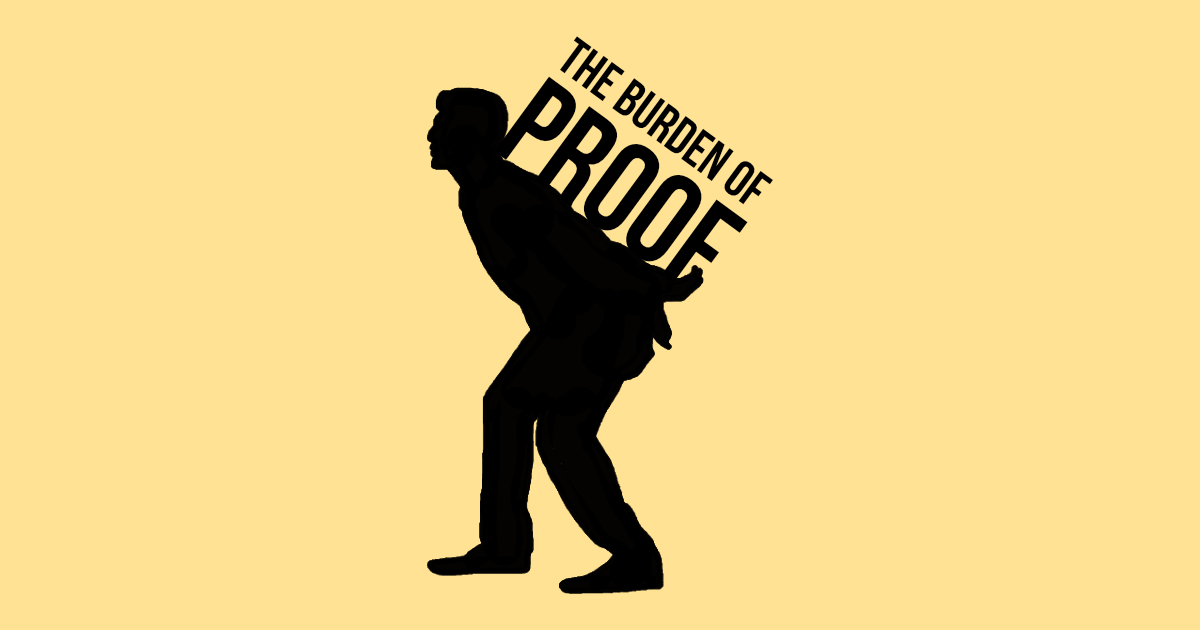 I see so many people getting this wrong that I thought I’d write a quick post on it. Lots of people misunderstand what the burden of proof is and when they actually have to trot their proof out. It’s really not that hard, but I’ve seen lots of people giving bad information, or at least suggesting bad information.
I see so many people getting this wrong that I thought I’d write a quick post on it. Lots of people misunderstand what the burden of proof is and when they actually have to trot their proof out. It’s really not that hard, but I’ve seen lots of people giving bad information, or at least suggesting bad information.
So here’s how it works.
Just to give an example, I see people over on the Atheist Experience and related shows saying that you don’t have to prove mundane claims. If you say that you have a dog, you don’t have to prove a thing. If you say that you have a dragon, you do.
That’s not really true though. It isn’t your call what you have a burden for, it’s up to whoever you’re talking to. I probably won’t ask you to prove you have a dog. Why? Is it because it’s a mundane claim? No, it’s because I don’t care. I am perfectly within my rights to ask to see a picture of your dog and then, you ought to show me. If you don’t, then I can choose not to believe your claim.
 If you tell me that you had Chinese food last night, that’s one thing and chances are, I won’t challenge it. If you say that you flew to China last night, had dinner and then came back, that’s another thing entirely and I’m probably going to call you on it. Why? Because it is a claim that seems unlikely. I want you to prove that it happened. If you refuse, I can’t do anything about it but my estimation of your honesty is probably going to plummet. You might not care about that, it’s entirely up to you, but that’s how the burden of proof works. You need to support any positive claim that you make, mundane or not, if someone asks you to do so.
If you tell me that you had Chinese food last night, that’s one thing and chances are, I won’t challenge it. If you say that you flew to China last night, had dinner and then came back, that’s another thing entirely and I’m probably going to call you on it. Why? Because it is a claim that seems unlikely. I want you to prove that it happened. If you refuse, I can’t do anything about it but my estimation of your honesty is probably going to plummet. You might not care about that, it’s entirely up to you, but that’s how the burden of proof works. You need to support any positive claim that you make, mundane or not, if someone asks you to do so.
The reality is, you don’t get to decide what questions I’m allowed to ask or what claims I’m allowed to disbelieve. That’s up to me. It’s sad that these things have to be explained, often very slowly, to so many people.
 In reality, the burden of proof is a way to keep people honest. Whether you choose to do it in every individual case is up to you. I probably don’t care about your dog or your lunch or anything like that. I might though and that means that you ought to be able to back it all up if I ask, even if I likely won’t. The same goes for me. If I say something that people question, it’s on my shoulders to support it, if I care at all about their opinion of me. There are some things I’m not going to back up because it’s none of their business, but usually, I don’t go making grandiose claims about things that I’m not open and honest about. In matters of online privacy? Sure, I get to make that choice, but generally speaking, I don’t.
In reality, the burden of proof is a way to keep people honest. Whether you choose to do it in every individual case is up to you. I probably don’t care about your dog or your lunch or anything like that. I might though and that means that you ought to be able to back it all up if I ask, even if I likely won’t. The same goes for me. If I say something that people question, it’s on my shoulders to support it, if I care at all about their opinion of me. There are some things I’m not going to back up because it’s none of their business, but usually, I don’t go making grandiose claims about things that I’m not open and honest about. In matters of online privacy? Sure, I get to make that choice, but generally speaking, I don’t.
 I just hate to see people getting it wrong because that reflects badly on all of us. The next time that I ask for corroboratory evidence for a claim, I might get someone saying they don’t have to because the hosts of the Atheist Experience said so. In fact, I’ve had that happen. I had a theist, not long ago, say they didn’t have to prove God because God was a mundane claim. After all, most people say they believe in a god of some sort, therefore, gods are just immune from any kind of rational evaluation.
I just hate to see people getting it wrong because that reflects badly on all of us. The next time that I ask for corroboratory evidence for a claim, I might get someone saying they don’t have to because the hosts of the Atheist Experience said so. In fact, I’ve had that happen. I had a theist, not long ago, say they didn’t have to prove God because God was a mundane claim. After all, most people say they believe in a god of some sort, therefore, gods are just immune from any kind of rational evaluation.
Yes, they really are that stupid. I find that utterly pathetic.